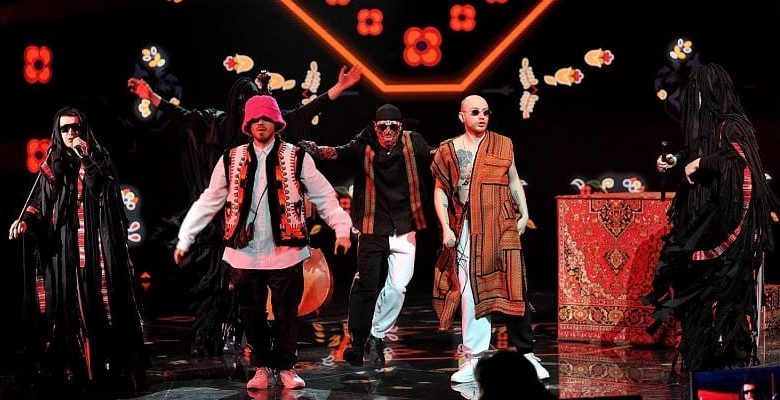Ukrainian band will rap for national pride at the Eurovision Song Contest
Given the devastating impact of Russia’s invasion of Ukraine, anything that raises the spirits of the beleaguered Ukrainian people is more than welcome. And a sliver of light relief could be on the cards next month at the Eurovision Song Contest in Turin, Italy, where Ukraine’s entry is a hot favorite to take the title.
Six-piece rap group Kalush Orchestra is named after the founding member’s hometown of Kalush in western Ukraine. The group was on a nationwide tour when the Russians invaded, and they came perilously close to some of the bombings. In the wake of the attacks, one member even joined the territorial forces defending Kyiv. And the band’s lead singer, Oleh Psiuk, has formed a volunteer organization to help people find shelter, medicine and transport.
Ukrainian men of fighting age are banned from leaving the country. But in the lead-up to the song contest, the band members, who are all eligible for a military call-up, were given special permission to travel abroad to join other Eurovision contenders for a promotional performance in Tel Aviv, Israel.
The show was Kalush Orchestra’s first international performance since the Russian invasion. During the visit, the band also got the chance to showcase their Eurovision song, “Stefania,” to an audience of Ukrainian immigrants and refugees in Jerusalem.
The lyric for “Stefania” is an ode to motherhood written sometime before the Russians invaded. However, in the current crisis, it’s been reimagined by the band and their fans as a metaphor for their love of their country.
While in Israel, Kalush Orchestra also filmed their Eurovision postcard, which is the introductory video played before each act on the night of the contest. Contestants usually film their postcards in their home nation, but that wasn’t possible for the Ukrainians because of the war.
Russia has been banned from competing in this year’s Eurovision Song Contest after the European Broadcasting Union ruled that their inclusion would bring the competition into disrepute. Russia had been part of the contest since 1994 and won the iconic glass microphone Eurovision trophy in 2008.
The Russians’ absence deprives them of a place at the world’s biggest live music event. The Eurovision Song Contest was first held in 1956. It was most famously won by the legendary Swedish supergroup ABBA in 1974 with a song called “Waterloo.” And that victory became the launchpad for a long and glittering international pop career.
Last year, the 65th edition of the contest was watched by 183 million viewers in 36 markets. Once maligned as laughably cheesy and unrepresentative of modern music, the made-for-TV extravaganza has had a major renaissance in recent years, capturing the zeitgeist with its clear `message` of inclusion and diversity. As a result, it’s now a guilty pleasure you can unashamedly enjoy. It has even spawned a U.S. imitation as the American Song Contest was launched this year.
In keeping with its uptick in cool, the audience for the Eurovision Song Contest is skewing younger than ever before. According to the organizers, more than half of the 15 to 24-year-olds watching television during last year’s broadcast had tuned in to Eurovision. While online, Eurovision content grabbed more than 50 million unique viewers across 234 countries during the week of the event. Two-thirds of the online audience was in the 18- to 34-year-old bracket. And not surprisingly, the Twitter demographic posted almost 5 million tweets about Eurovision on the night of last year’s final.
This year, Ukraine will be among 17 national acts in the first semifinal on May 10. The second semifinal follows two days later. And the Grand Final is scheduled for May 14 at the Pala Olimpico, Italy’s largest indoor sporting arena.
Ukraine has won the competition twice before, in 2004 and 2016. Clearly, Kalush Orchestra would love to make it a hat-trick. But a `win` for the band would mean much more than gold. And the group understands that victory would not only highlight modern Ukrainian culture but also would be a source of national pride, hopefully resulting in a boost of morale back home.
But even if Kalush Orchestra hit a sour note, the fact that a Ukrainian group is competing at all is a minor miracle in itself. Yes, it’s just a singing contest. But perhaps it can offer Ukrainians a small reminder that normality still exists somewhere out there.
This post is also available in:
 English
English  Русский (Russian)
Русский (Russian)






